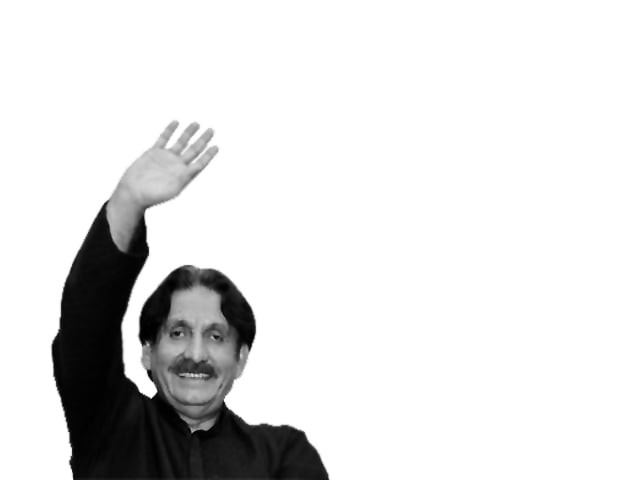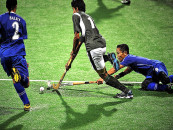5-and-5: The highs and lows of the outgoing CJ of Pakistan
The 'bad' the Court did was almost the grand. The 'good' was mostly micro, less glamorous, less adversarial.

To take full stock of what Iftikhar Chaudhry did in his tenure in a few hundred words is not possible. Primarily, because he did so much.The desire to do too much too quickly is always dangerous, exponentially more so when one of the most powerful individual in the country is consumed by it.
To generalize, the "bad" that the Court did was almost the grand, the macro, the great philosophical, political and moral questions; the Court got most of them wrong, as most Courts do.
The "good" that came was mostly the micro, the less glamorous, less adversarial, the human rights issues and the problem was that there was too little of that. However, on the rare occasions promise was displayed, and it lowers the spirit to think of the splendors withheld, of what could have been. Alas it was not to be, the desire of self advancement meant to take the center role in the largest of stages.
However perhaps there is a lesson somewhere for those following in the footsteps of Justice Chaudhry. History is rarely kind to those who seek instant glory. The subject and the object of future exercises in judicial activism should be the marginalized and not the Court itself.
Although the balance is tilted heavily towards one side, in the interest of fairness and parting courtesy, here are some of the best and worst judgments of the Chaudhry court.

THE WORST CASES

1. The PCO Judges Case
The 31st July, 2009 Judgment was one of the earliest judgment that gave an indication of things to come from the post restoration judiciary. The lawyers movement was based on one seminal principle, namely, that Judges of the Superior Courts (High court and Supreme Court) cannot be sent home without the due process articulated in Article 209, and in the PCO judges case the CJ and the court by sending more than one hundred judges home did exactly what their grievance was against General Musharraf.
[poll id="1262"]

2. The NRO Judgment
The question in the NRO judgment was simple strictly formal legal question, namely, if the NRO was valid law or not. It was not the final verdict but the process which was very problematic. The court not only struck down the NRO (which it could) but also wrote around 290 pages, most of them dealt with morality, politics and the court's version of history.
[poll id="1263"]

3. The Memo Commission
This was an extraordinary and unprecedented exercise. The Court had no legal basis of holding the matter justiciable (admit it to hearing) as it ostensibly pertained to foreign policy. The fact that it did so, was either a case of very poor judgment or else was not completely bonafide.
[poll id="1264"]

4. Arslan Iftikhar Case
This was again incredible in so far as the Chief Justice himself sat on the bench that took suo motu notice of the case. Again, an egregious disregard of the code of conduct and the principle of not being a judge in own cause. And the subsequent handling, even after the CJ had recused himself had major problems of neutrality, objectivity and most importantly that justice was clearly not seen to being done.
[poll id="1265"]

5. The Disqualification of PM Gilani
The PM Gilani contempt and the NRO implementation proceedings were problematic at multiple levels. Legally, the issue was that the original seven member bench had not disqualified PM Gilani and a subsequent three member bench doing it meant overruling the seven member bench, a rather ridiculous thing. Also, the power to disqualify lay arguably with the Speaker National Assembly and the Election Commission of Pakistan, the court rendered both of them redundant in this case.
[poll id="1266"]

THE BEST CASES 
1. The judgment providing impetus for legislation on Acid Violence
In a Judgment passed on 20th November 2009, while hearing a suo motu case involving throwing of acid on the face of a young girl. The Court emphasized the need for having specific legislation dealing with it and also looked at laws dealing with the practice in Bangladesh etc, and recommended to the government that a law be drafted and passed, and free medical aid and rehabilitation facilities be provided to the victims. The law was passed in 2011.
[poll id="1267"]

2. Investigation and Prosecution of Rape
In 2012 the Court took up a petition against the Punjab Government under Article 184 (3) dealing with measures that would improve the investigation and prosecution of rape. The court gave directions to the Punjab government to implement the guidelines articulated by the court, including better recording of victim's statements, preserving DNA evidence etc.
[poll id="1268"]

3. Rights of Hijras
In 2009, the court issued a judgment recognizing and granting rights to the "Hijra" community. This judgment and subsequent follow up petitions on the matter have laid meaningful jurisprudence which will be useful not only for the Hijras but also for granting of rights to other marginalized groups in the future.
[poll id="1269"]

4. The Asghar Khan Case
This was the first time that the military establishment's practice of influencing and manipulating the electoral process was formally recognized and people, both military and intelligence agencies along with the political beneficiaries were named and acknowledged. Although, unlike the NRO no implementation proceedings were started and the Court stopped short of actually holding individuals accountable, still it was a step, albeit a small one, in the right direction.
[poll id="1270"]

5. Missing Persons Case
The missing persons case has not changed all that much up to now. However, it is perhaps the first serious attempt by the judiciary to hold the military establishment accountable for impunity and violation of fundamental rights. The Court has not displayed the same aggression towards military top brass as it routinely did with the political leadership. Yet, it has brought the issue in the mainstream debate in an important way, and that is an achievement of the court.
[poll id="1271"]
The writer is a lawyer and partner at Ijaz and Ijaz Co in Lahore. He is a regular contributor to The Express Tribune's oped pages saroop.ijaz@ tribune.com.pk



















COMMENTS
Comments are moderated and generally will be posted if they are on-topic and not abusive.
For more information, please see our Comments FAQ